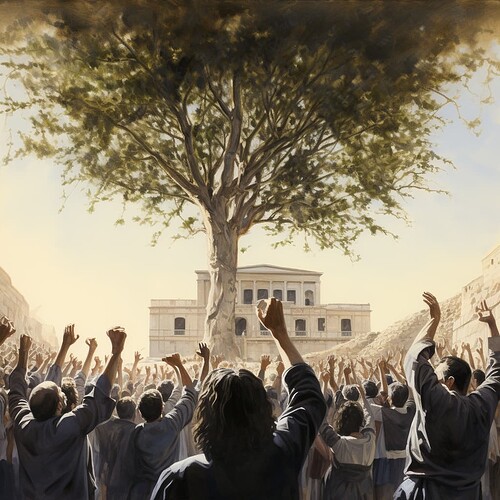 February 1: Romans 10, 11: Salvation for All, God’s Mercy is Boundless
February 1: Romans 10, 11: Salvation for All, God’s Mercy is Boundless
 Introduction:
Introduction:
In Romans 10 and 11, Paul continues to expound on God’s plan of salvation, explicitly calling out to both Jews and Gentiles - that is, everybody. These chapters form an integral part of understanding God’s boundless mercy and continuous plan for mankind.
 Matthew 10: Salvation is Open to All
Matthew 10: Salvation is Open to All
Even as he wrote to Roman Christians, Paul’s heart ached for his own people, the Jews, who pursued righteousness without recognizing Christ as the end of the law.
Key Verse: Romans 10:9
“Because if you confess with your mouth that Jesus is Lord and believe in your heart that God raised him from the dead, you will be saved.”
 Romans 11: God’s Mercy Poured Out
Romans 11: God’s Mercy Poured Out
Paul explains that God did not reject the Jews but extended His mercy to include all who believe. He uses the metaphor of an olive tree which signifies the rooted faith of the Jews and branches (Gentiles) being grafted.
Key Verse: Romans 11:17
“But if some of the branches were broken off, and you, although a wild olive shoot, were grafted in among the others and now share in the nourishing root of the olive tree…”
![]() Key Themes and Reflections
Key Themes and Reflections
-
Salvation for All: These chapters highlight the universal nature of Christian faith. Neither Jew nor Gentile is higher or lower in God’s eyes, but both are merely different expressions of God’s plan.
-
God’s Boundless Mercy: God’s love is so immense that He is willing to graft non-Jews into the tree of salvation. This inclusion acts as a reminder of the immeasurable nature of God’s love and His ability to save all.
![]() Today’s Application
Today’s Application
Each day, let us confess with our mouth that Jesus is Lord and believe in our heart that God raised him from the dead. Let us appreciate and respect different Christian practices, for in the end, we all share in the nourishing root of the olive tree.
![]() Hidden Gem
Hidden Gem
The olive tree metaphor reminds us that we are one in Christ, irregardless of our ethnic, racial, or religious backgrounds. The tree is sturdy and strong, offering nourishment to all of its branches.
![]() Reflective Q&A:
Reflective Q&A:
![]() What does it mean to be ‘grafted’ onto the ‘olive tree’?
What does it mean to be ‘grafted’ onto the ‘olive tree’?
A: It symbolizes our acceptance and inclusion into God’s family through faith in Christ.
![]() How can we apply God’s boundless mercy in our daily lives?
How can we apply God’s boundless mercy in our daily lives?
A: By showing mercy and acceptance to everyone we meet, reflective of how God shows mercy to us.
![]() Join the Discussion:
Join the Discussion:
Reflect on your relationship with Christ. How do you show God’s boundless mercy to others around you? Share your thoughts in the community!
![]() See You Tomorrow in Romans 12
See You Tomorrow in Romans 12
Don’t miss our discussion on living sacrifices and love in action. Be sure to launch your AIgniteScripture app and dive into God’s Word with us.
